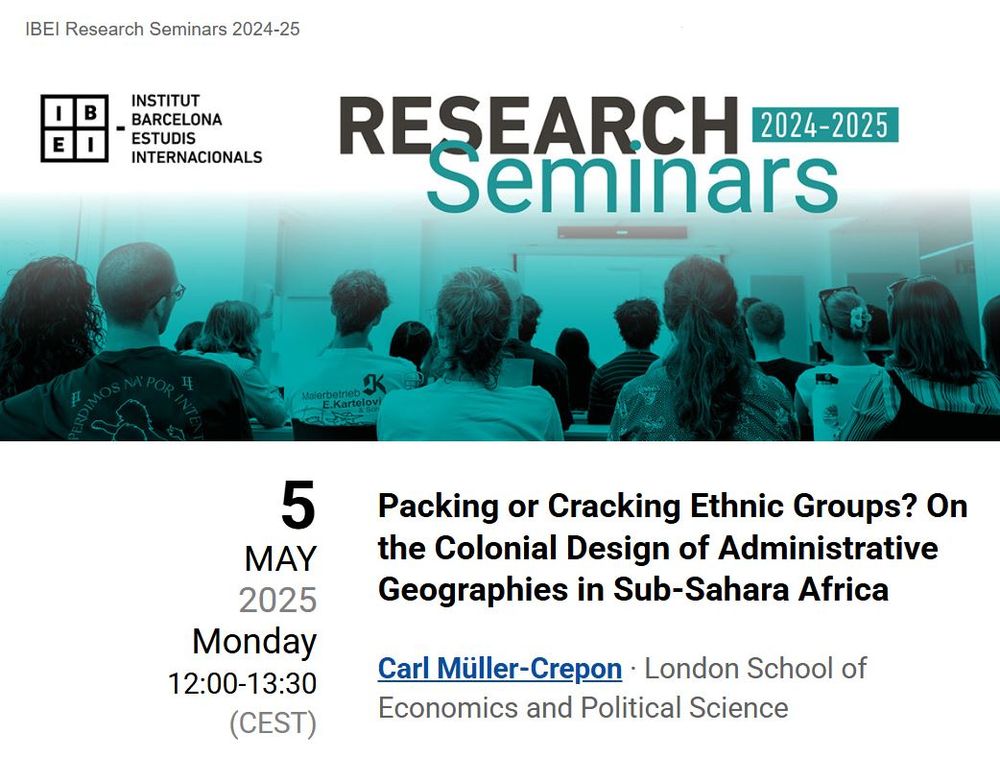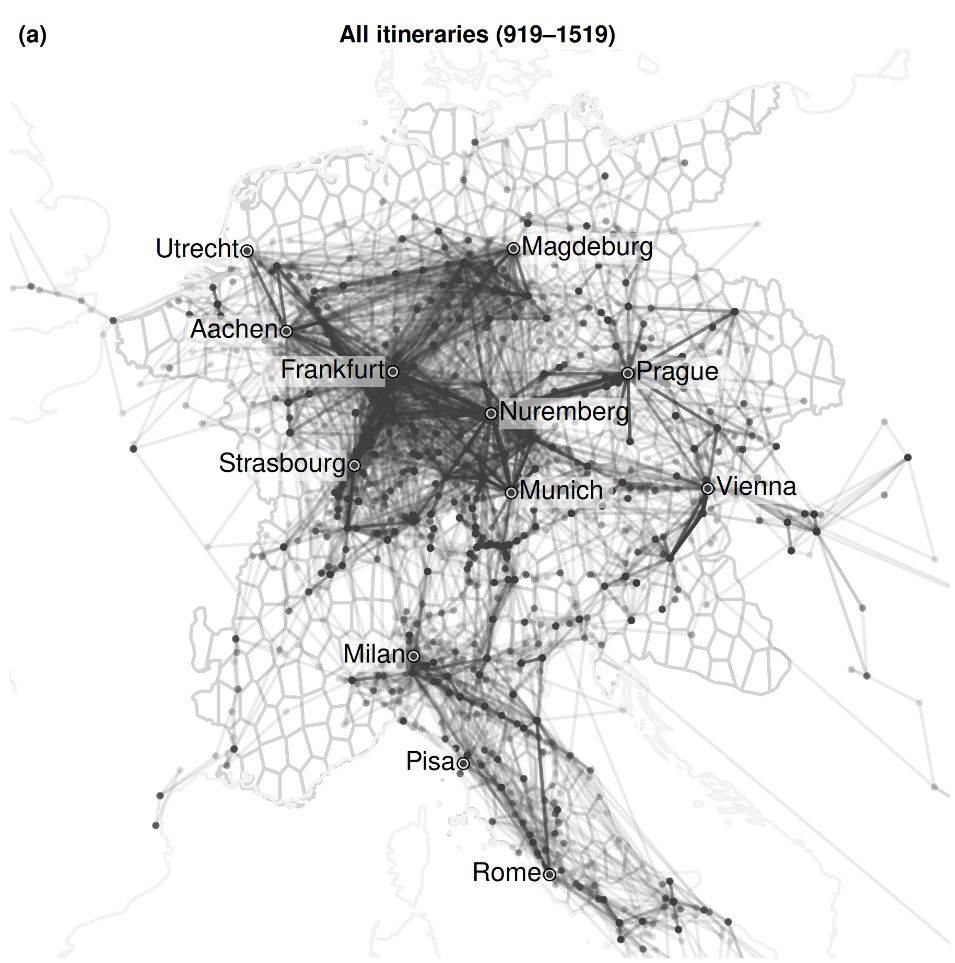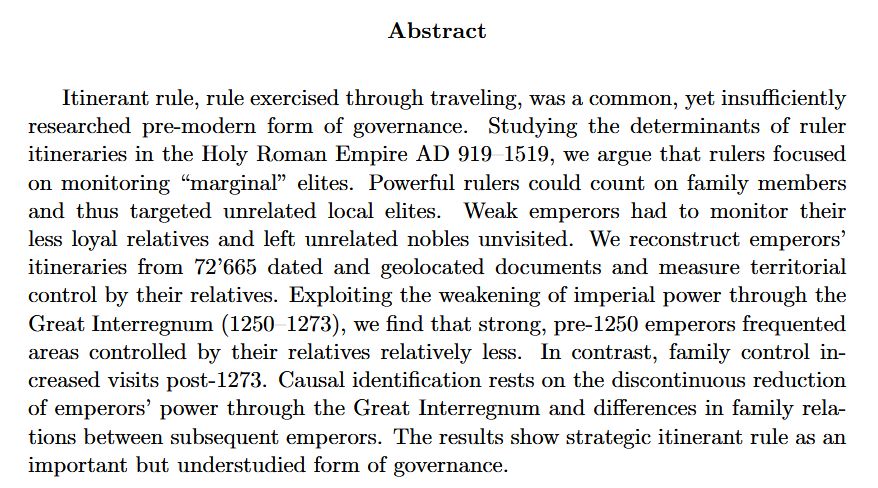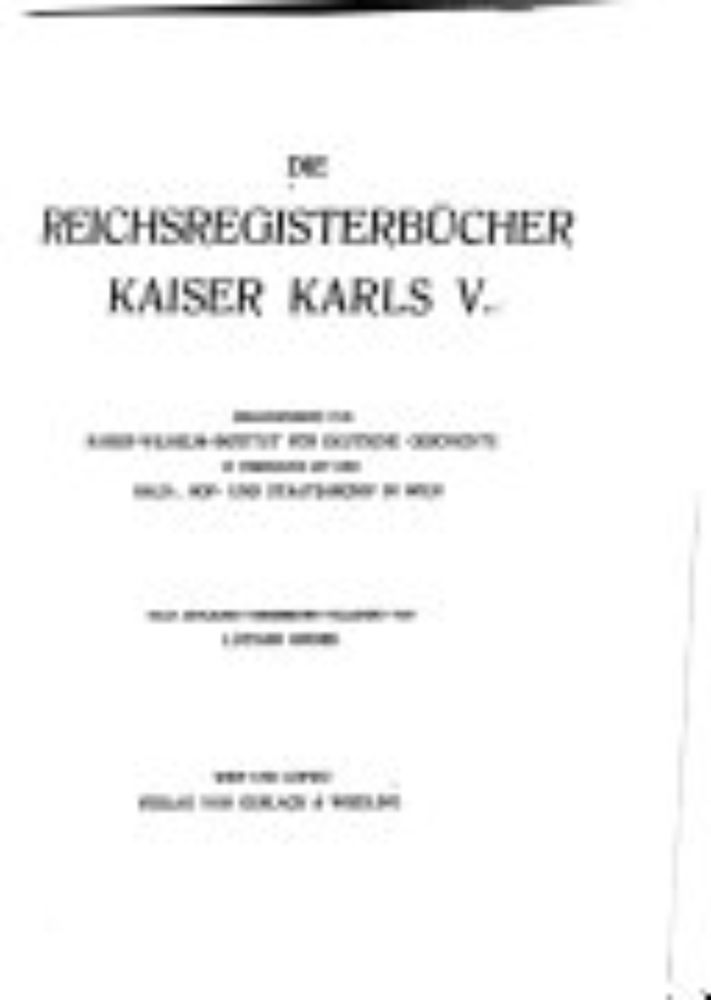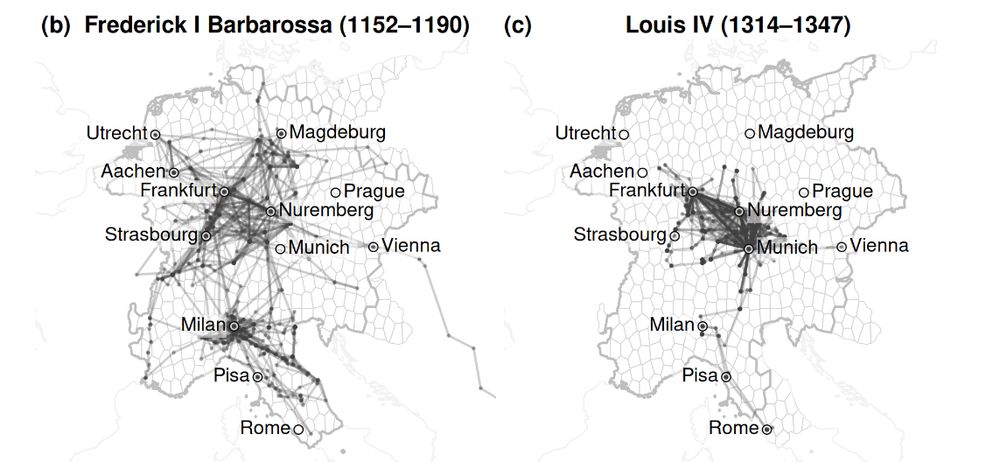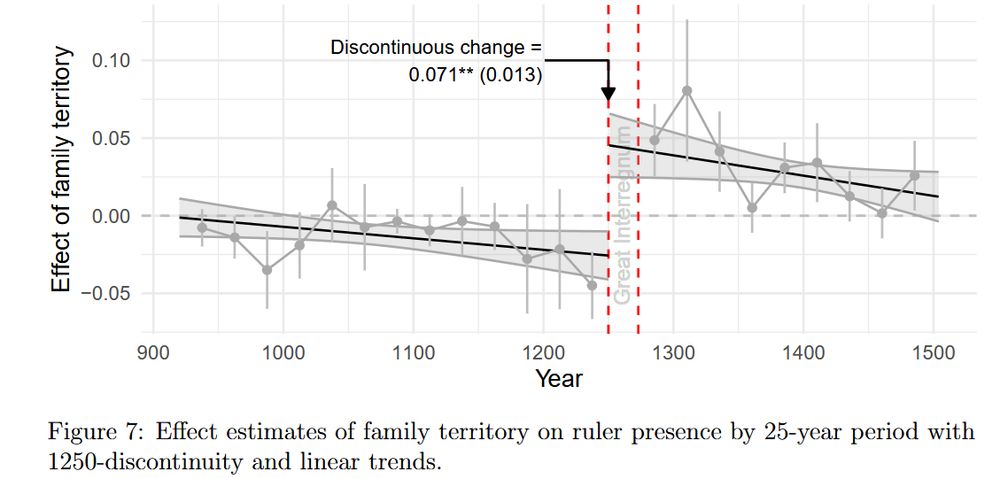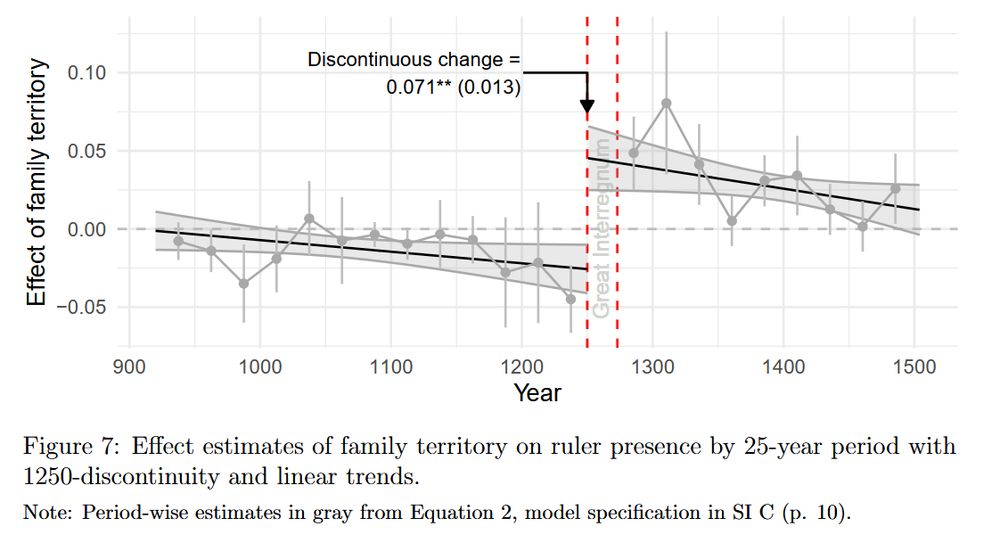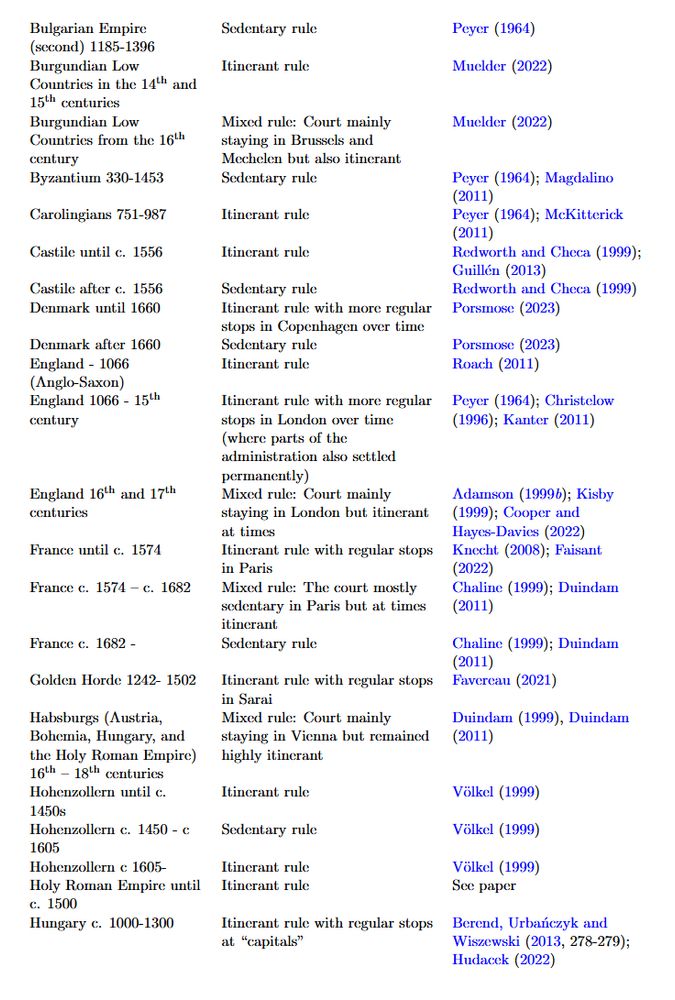Carl Müller-Crepon
Human, Learner, Voyager, Citizen. Polisci research on the state, development, and conflict. Assistant Professor @ LSE Department of Government. Previously Oxford and ETH Zurich. https://carlmueller-crepon.org
- On my way to Barcelona — I’m very excited to be presenting my research on subnational colonial borders tomorrow at @ibei.org ! www.carlmueller-crepon.org/publication/...
- 🔎 Packing or Cracking Ethnic Groups? Join us for the next #IBEIresearchSeminar with @carlmc.bsky.social from @lsegovernment.bsky.social, focused on Colonial Strategies in Shaping Administrative Borders in Sub-Saharan Africa. 🗓️ 5 May 🕛 12:00h 📍 IBEI 👉 Info & registration: t.ly/ukAvT
- 🚨 Very excited that our paper on *Rulers on the Road* has been cond. accepted at the AJPS @ajpseditor.bsky.social. We analyze emperors' strategies of itinerant rule in the Holy Roman Empire 919-1519. Fun working with @claranw.bsky.social, @andrejkokkonen.bsky.social & Jørgen Møller shorturl.at/Spm7z
- [Not loaded yet]
- Thank you Ada!!
- [Not loaded yet]
- Thank you Joan!!
- [Not loaded yet]
- Thanks Roberto!!!
- [Not loaded yet]
- A homogeneous history panel might habe a hard time, but a mixed panel with historians and political scientists would probably have a good shot at getting accepted (plus fostering dialogue directly through the panel). Would definitely be worth trying!
- [Not loaded yet]
- Indeed — one question I have in that regard is ob how to facilitate such exchange beyond ad hoc opportunities via bsky/twitter… any good ideas?
- [Not loaded yet]
- This registry for Charles V by L. Gross from 1913 would allow for a similar exercise: books.google.ch/books?hl=en&...
- [Not loaded yet]
- Wow -- this is super helpful, I wasn't aware of Gévay's work or the new reichstagsakten.de platform. Thank you so much! 🙏 This conversation is like Twitter in its best days! 🙏
- [Not loaded yet]
- Indeed -- are you by any chance aware of work on the Habsburg itineraries after Max I? Or systematic compilations like the regesta imperii which could be used to reconstruct them?
- [Not loaded yet]
- Honestly, it's been almost completely overlooked by political scientists who all too often view the "state" in modern terms as a territorial entity ruled more or less homogeneously through some sort of centralized bureaucracy. All of which doesn't hold for many historical polities.
- I think this is probably true: One goal of our larger project with @andrejkokkonen.bsky.social as PI is to study the shift from itinerant to sedentary rule under the Habsburgs - how the development of intermediary institutions / elites substituted for rulers' presence (+ trade-offs in substitution)
- This question also touches on the varying *effects* of rulers' presence which is very important but very hardto study (given that their presence will be strategic to produce certain effects, thus studying the same is quite hard)
- [Not loaded yet]
-
View full threadWe totally agree -- the visualization of the all itineraries is only to give a general overview over the data. We will make the data interactively available such that one can plot individual emperors or even just years similar to the below examples from the paper.
- Also note that the paper pays most attention the sharp change in strategies of itinerant rule across the Great Interregnum 1250-73 in order to avoid drawing inferences from sweeping comparisons between the 10th and 15th centuries.
- 5. You are also right that itineraries only offer only one slice of rulers' "reach" - looking at assemblies and their attendants, letters, and visits to the king/emperor would indeed yield a more precise picture of a full (geographic) "interaction network" among elites with lots to learn from.
- Thanks for engaging so constructively with our work!
- 3. While the impact of techn. change and the growth of centralized institutions would be fascinating to study, they cannot explain the stark discontinuity in rulers' destinations across the interregnum. Stopping in 1400 does not alter the gist of this finding.
- 4. But all in all we agree that it would indeed be great to study how the growing importance of pan-imperial institutions since the 15th century affected / slowly upended patterns of itinerary rule.
- Thank you so very much for these comments which are all super relevant! Some quick reactions: 1. We agree that the dynamics of (itinerant) rule start changing with the Habsburgs towards the end of the period we analyze. We therefore stop with Maximilian I, who still traveled an avg 2k-3k km/year.
- 2. The increased role of princes and other elites after the Great Interregnum might be at least partially endogenous to the weaker imperial power. We also mention the structural dualism in the paper (thanks for pointing us to Moraw's work) and how imperial institutions expanded over time.
- [Not loaded yet]
- Definitely to Frankfurt!
- [Not loaded yet]
- That’s a chat, then ;-) — will follow up by mail.
- [Not loaded yet]
- That would be fascinating! Let’s definitely chat about that!! @andrejkokkonen.bsky.social , what do you think?
- [Not loaded yet]
- Thank you Elena!
- [Not loaded yet]
- That's so good to hear! 🙏
- [Not loaded yet]
- Thank you so much, that's great to hear! Best thing: it got better through the review process where we added quite a bit of material.
- [Not loaded yet]
- Thank you Zeth, that's very kind and humbling!
- [Not loaded yet]
- Thank you Magnus!!
- [Not loaded yet]
- Thank you Ali, also for your comments at the first presentation at EPSA 2022 in Prague!!
- [Not loaded yet]
- [Not loaded yet]
- Seems to me that Faisant and Knecht do that as well -- but it would be interesting to see how regular and long the stops in Paris were.
- [Not loaded yet]
- Thank you Aditya!!
- [Not loaded yet]
- Thank you!!
- [Not loaded yet]
- Thank you Giacomo, also for our chat about the paper back in Barcelona!
- Thank you Hein, also for your comments in Zurich! In case this is interesting, our Appendix now includes a long list of historical polities in Europe and beyond, coding whether their rulers were itinerant or sedentary (excerpt w/ France below):
- [Not loaded yet]
- So sorry this happened Kai! It’s really just incredible and super maddening.
- [Not loaded yet]
- Congrats Joan, those are fantastic news!!
- Super important! Knowing about the insides of software/stats black-boxes also enables further improvements and adjustments to context.
- [Not loaded yet]
- Plus this: on.ft.com/4j21uWI The US may be reversing course on child labour
- Very excited about @ethanbdm.bsky.social's lecture "AI goes to war" today at LSE at 6pm. Register here: www.lse.ac.uk/school-of-pu...
- [Not loaded yet]
- Seems like it was just a year ago on March 26 2024.
- [Not loaded yet]
- [Not loaded yet]
- Indeed, though I believe that our logic is less localized
- [Not loaded yet]
- Thanks Joan! Michael Hechter was on the case years ago ;-)
- [Not loaded yet]
- Thank you Jan!!
- [Not loaded yet]
- Thank you Sara!!
- [Not loaded yet]
- Thanks Pavi!! Also for your comments when we presented it at LSE!
- [Not loaded yet]
- Thanks Josef!!
- [Not loaded yet]
- thank you!
- [Not loaded yet]
- [Not loaded yet]
- … democracy plus unchecked capitalism….


